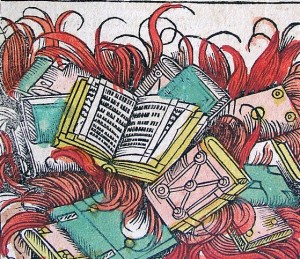This Sunday marks the beginning of a special week for libraries- it is Banned Books Week, which begins this Sunday, September 27th, and ends on Saturday, October 3rd. During this week, libraries, publishers, booksellers, journalists, teachers, and readers of all types celebrate the freedom to read and “the freedom to seek and to express ideas, even those some consider unorthodox or unpopular.” During this week, the American Library Association focuses on efforts nationwide to remove or restrict access to books and draw national attention to the harms of censorship.
 People usually associate “banned books” with book burning for religious reasons in the Middle Ages. It has occurred in more recent history, however. The Nazis burned books during the Holocaust as a way of attempting to erase the entire history and culture of the Jewish population. More recently in the United States, Harry Potter books have been burned by religious groups who view them as having occult themes. Although they were not burned, in Arizona in 2012, Mexican-American studies programs were eliminated from public schools, and the books from the readings lists for those courses were removed from school libraries. This led to the “Librotraficante” movement. Groups who wish to censor or restrict the spread of certain ideas often do this by pressuring libraries and schools into removing certain books. Banned Books Week is a celebration of the fact that in most of these cases, the books continue to be available.
People usually associate “banned books” with book burning for religious reasons in the Middle Ages. It has occurred in more recent history, however. The Nazis burned books during the Holocaust as a way of attempting to erase the entire history and culture of the Jewish population. More recently in the United States, Harry Potter books have been burned by religious groups who view them as having occult themes. Although they were not burned, in Arizona in 2012, Mexican-American studies programs were eliminated from public schools, and the books from the readings lists for those courses were removed from school libraries. This led to the “Librotraficante” movement. Groups who wish to censor or restrict the spread of certain ideas often do this by pressuring libraries and schools into removing certain books. Banned Books Week is a celebration of the fact that in most of these cases, the books continue to be available.
The following is a list of classics that have been censored in the past and are now part of the high school essential reading canon. Read about the reasons for the challenges against each book here.
The Great Gatsby, by F. Scott Fitzgerald
The Catcher in the Rye, by J.D. Salinger
The Grapes of Wrath, by John Steinbeck
To Kill a Mockingbird, by Harper Lee
The Color Purple, by Alice Walker
Ulysses, by James Joyce
Beloved, by Toni Morrison
The Lord of the Flies, by William Golding
1984, by George Orwell
Lolita, by Vladmir Nabokov
Of Mice and Men, by John Steinbeck
Catch-22, by Joseph Heller
Brave New World, by Aldous Huxley
Animal Farm, by George Orwell
The Sun Also Rises, by Ernest Hemingway
As I Lay Dying, by William Faulkner
A Farewell to Arms, by Ernest Hemingway
Their Eyes Were Watching God, by Zora Neale Hurston
Invisible Man, by Ralph Ellison
Song of Solomon, by Toni Morrison
Gone with the Wind, by Margaret Mitchell
Native Son, by Richard Wright
One Flew Over the Cuckoo’s Nest, by Ken Kesey
Slaughterhouse-Five, by Kurt Vonnegut
For Whom the Bell Tolls, by Ernest Hemingway
The Call of the Wild, by Jack London
Go Tell it on the Mountain, by James Baldwin
All the King’s Men, by Robert Penn Warren
The Lord of the Rings, by J.R.R. Tolkien
The Jungle, by Upton Sinclair
Lady Chatterley’s Lover, by D.H. Lawrence
A Clockwork Orange, by Anthony Burgess
The Awakening, by Kate Chopin
In Cold Blood, by Truman Capote
The Satanic Verses, by Salman Rushdie
Sophie’s Choice, by William Styron
Sons and Lovers, by D.H. Lawrence
Cat’s Cradle, by Kurt Vonnegut
A Separate Peace, by John Knowles
Naked Lunch, by William S. Burroughs
Brideshead Revisited, by Evelyn Waugh
Women in Love, by D.H. Lawrence
The Naked and the Dead, by Norman Mailer
Tropic of Cancer, by Henry Miller
An American Tragedy, by Theodore Dreiser
Rabbit, Run, by John Updike
A list of the most frequently challenged books for 2014, and the reasons for the challenges, can be found here. The McAllen Public Library is very proud to own copies of all of these challenged books.

